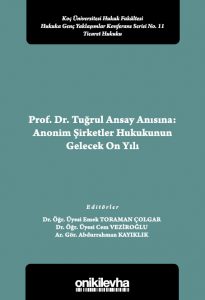July 12, 2023
A New Era in Private Supervision in Light of German Law Practice: Contractual Private Audit
Res. Asst. Burcu Karakuş Erbaş*
The special audit is regulated by Articles 438 to 444 of the Turkish Commercial Code (TCC). Article 438 of the TCC stipulates that any shareholder may request a special audit at the general meeting, and Article 439 of the TCC stipulates that if the special audit request to the general meeting is rejected, minority shareholders may apply to the court and request the appointment of a special auditor. However, these special audits, which are conducted in a legal manner, may have some effects on the company and the shareholders. Examples of the negative situations that may arise for companies include the high level of public interest due to the fact that the process of appointing a special auditor is referred to the court and the risk of financial damage to the company in this direction, the fact that the company generally bears the costs of the special audit and the special auditor, the company cannot interfere with the personality of the special auditor and the special audit process, and the final decision on the interventions to be made by the company to protect the company’s secrets and interests regarding the content of the special audit report is left to the court.
On the other hand, the fact that a request for a special audit can only be made if it is necessary for the exercise of shareholders’ rights, the fact that the determination of the subject matter of the special audit is subject to certain rules of the legislator, and the delayed access to the requested information due to protracted judicial process can be mentioned as examples of negative aspects that may arise for shareholders. These negative consequences of the statutory special audit have led to the emergence of a new type of special audit under German law. This type of special audit is the contractual special audit. The purpose of the contractual special audit is to minimize the damage caused to companies and shareholders by the statutory special audits. The principles of this special audit are based on a framework agreement to be concluded between the company and the shareholders. In this agreement, the parties are free to determine the content of the agreement in accordance with the principle of freedom of contract. Accordingly, the parties may agree on a general scope, such as in which cases and for which matters a contractual special audit may be applied, and may even specify the personality of the special auditor.
Key words: Corporation, special audit, framework contract, freedom of contract, the exercise of shareholder rights.
For the full text of this blog post in Turkish, please click here.
* Nevşehir Hacı Bektaş Veli University, Faculty of Administrative Sciences and Economics, Department of Business Administration – Branch of Commercial Law

